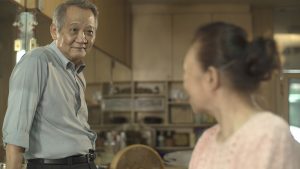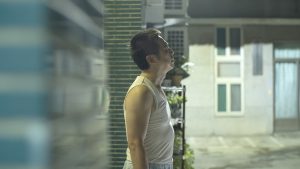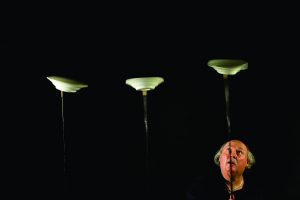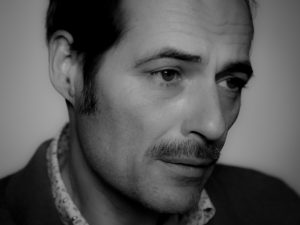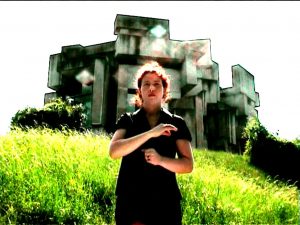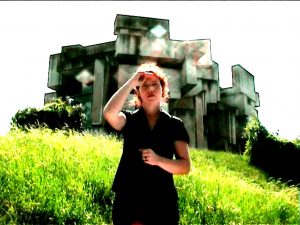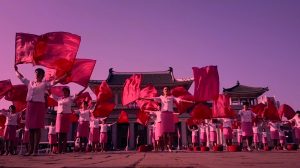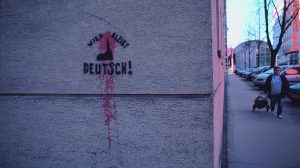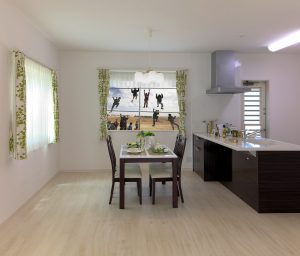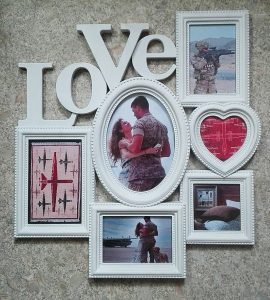SOHO’19
What´s that? About freedom of expression and the struggles around it.
“I believe in fight, I believe human beings learn from confrontation, from discussion, from struggle. Education means exchanging perspectives. When we discuss about prejudices, ideas, values, politics, with other people, we learn. That’s the point.”
Freedom of expression and assembly, cornerstones of a democracy
When voices are heard that are “fed up” with democracy because diversity and freedom of expression of the “wrong” people are annoying, they want to split society and determine who is on the “right” side and in the “right” garb.
Which kind of democracy is meant, when we talk about it? Is it free consumption? Free travel for free citizens? Freedom of art?
One of the most important foundations in a democracy is the freedom of expression and assembly. In Austria, freedom of expression is enshrined in the Constitution.
It is also an important part of the Universal Declaration of Human Rights, in which is stated: “Everyone has the right to freedom of opinion and expression; this right includes freedom to hold opinions without interference and to seek, receive and impart information and ideas through any media and regardless of frontiers.” (Article 19 of the Universal Declaration of Human Rights).
Free exchange of opinions and thought among citizens can only take place with the support of a critical free media. But what does freedom in the media landscape mean, how is information processed and who can be reached? Is our opinion still free in a world of online media and online networks where algorithms determine which media reaches us directly?
Currently, Democracy is often undermined and interpreted in terms of nation-state interest through tricky manipulation of political demagogues.
Not to lose vigilance requires not only a critical media landscape, but also confrontation with people who think differently, for example in debates. Why is that important? Listening to, comprehending and debating complex issues is one way to consider multiple perspectives, which are always related to different realities of life.
This keeps democracy vibrant and alive. Without it, voices fall silent or they are being silenced. A fundamental affirmation of diversity and tolerance of those who think differently are lost.
In whatever context people live, a society needs a we-feeling. This sense of being, however, can also be manipulated on an emotional level so that half-truths, misinformation, hate messages are constructed and creepingly accepted. To imagine other worlds and to consider them is just as important as seeing your own interests represented.
A look beyond the national borders helps shape new perspectives. The basic idea of a united Europe of peace and stability must be strengthened so that the process of dangerous nationalistic interpretations of democracy and the withdrawal of common values of the Human Rights Conventions are not undermined.
Now, who can participate in shaping the future? The answer might be that strong civil participation and democratic awareness be intensified and promoted at all levels, through outreach at the micro level in particular.
Program in detail
20 years of SOHO in Ottakring:
Jubilee party & anniversary celebration, 04.10.19
18:00 Book launch:
SOHO in Ottakring 2008 – 2018:
„Unsicheres Terrain“ / „Destabilized Ground“
(Ed.: Ula Schneider, Wolfgang Schneider, Beatrix Zobl; Verlag der Provinz, ca. 264 pages)
19:00 Performance by Julischka Stengele
19:30 Opening words
20:15 Harri Stoyka
20:30 Esrap (requested)
21:45 Joshua Korn
22:30/23:00 -2:00 DJ Chilo Eribenne
Venue:
Gallery „Die Schöne“, Kuffnergasse 7, 1160 Viena
Free opinion in times of populism
Exhibition on art and freedom of expression
Artists: Karolina Breguła, Miklós Erhardt, Lena Lapschina, Hansel Sato
Opening: October 8/ 2019
Exhibition duration: October 9 – 27/ 2019
Venue: Old Cinema at Sandleitenhof, Liebknechtgasse 32, 1160 Vienna
Collaborating partners: IKL – Institute for Artistic Teaching at the Academy of Fine Arts
In neighboring Central European countries, such as Hungary and Poland, freedom of expression and critical media reporting are severely limited through conservative, authoritarian governments. Diversity of opinion, political participation and transparency constitute a threat to their power.
Taking into account historical circumstances and the importance of membership in the European Union, Miklós Erhardt, artist from Hungary and Karolina Breguła from Poland are invited to participate in the exhibition with works of art on freedom of artistic expression. The international positions are juxtaposed with works of art by the two artists Lena Lapschina and Hansel Sato who lives in Austria.
The aim of the exhibition is to visualize the situations in Hungary and Poland out of a perspective of those affected, to encourage a reflection and to explore the dangers and effects of limited freedom of expression in the Austrian context.
Karolina Breguła is an artist in the fields of film, video, photography, installation and happening. She studied at the Film School in Łódź, where she graduated in 2015. Her work examines the problems of the status of the artwork, the materiality of art objects and their functioning within the institutional framework. The artist questions the reception of contemporary art and undermines official art narratives, also questions their hermetic language and opens up new interpretations. Breguła encourages viewers to take an active part in the process, to interact and to challenge the established modes of reception. The artist investigates the problem of the social role of art and the myths that revolve around it. Despite her knowledge of limitation, Breguła tries to get art out of the showroom. Her films inhabit the areas of contemporary art and cinema – they are shown both in art galleries and at film festivals. She lives and works in Warsaw.
The artist Miklós Erhardt (born 1966,) explores in his works by means of interventionist and documentary methods artistic possibilities of action in relation to socio-political and economic issues. He is particularly interested in personal stories and experiences. He lives in Budapest.
Lena Lapschina, born in Kurgan, Siberia, graduated from the Stroganov State University of Visual and Applied Arts in Moscow. Lapschina’s work traverses various disciplines such as video, sculpture and installation and shows a strong inclination towards public / semi-public places and their mutual influence in private areas. She lives in Vienna and Lower Austria
Hansel Sato (Peru / Austria) is a visual artist and cultural mediator. His artistic work encompasses representational painting, comics, drawing and public art interventions in the context of postcolonial theories. Since 2013 he has been part of the SOHO team in Ottakring and senior lecturer at the Institut for Artistic Teaching (IKL) of the Academy of Fine Arts in Vienna. He lives in Vienna.
Miklós Erhardt:
Lena Lapschina:
Hansel Sato:
Accompanying program as part of the exhibition
• Mediation
In collaboration with the IKL – Institute for Artistic Teaching at the Academy of Fine Arts, a mediation format is developed for different age groups. In addition, the participating artists are invited to present their work in conversations in the context of the main topic.
• Debate
SOHO in Ottakring would like to take up the tradition of debates, a well-known format from the Anglo-Saxon area. Debates promote intellectual diversity and are often shown in the UK in front of a large audience. The core aspect of a debate is the confrontation of two or more guests in each case, mostly public figures who represent contrary opinions on a topic.
The format of a moderated debate should focus on an engagement with the active participation of the audience. The goal is to break with a discussion format in the sense of “preaching to the converted” and “fuel” a discourse through controversy.
Debate 1: What significance does free opinion have in today’s society?
Guests: will be announced
Moderation: Michael Kerbler, Kombinat3
Freedom of the media is much discussed in today’s democratic societies. In times of overflowing information, critical media find it difficult to reach a broader audience as a source for reflective opinion making.
Information, e.g. on the Internet, is often constructed as “facts” for groups of people with particular interests and also used in politics manipulatively. Self-proclaimed journalists have little responsibility for what they distribute. In addition, “hate posts” spread fear and frustration. The influence of populist media in the yellow press spreads common prejudices on a daily basis. Sexism, racism, homophobia are often propagated as part of normal daily life. Last but not least, these developments are driving forward a division of society.
What different strategies are needed to ensure that freedom of opinion and thus a just democratic society are not undermined in the context of manipulated information? How can pressure be put on politics to fulfill this responsibility through comprehensive education and better educational opportunities?
• “Freedom of Expression” and “Hate Speech” – a search in urban democracy
with Danila Mayer
Based on the European project FreeEx, Danila Mayer investigates where and how in today’s Viennese society opinions, positions, emotional worlds pass each other or meet one another, where they are being negotiated ‘live’ and how this is happens. – She refers to the term ‘arena’ in the anthropology of Victor Turner.
Danila Mayer holds a doctorate in social sciences and is a member of “The World of NGOs”. She has researched numerous topics in Vienna and participated in artistic and social projects. Her interest in high-cultural institutions of the Republic of Austria connects her with the practice of diversity and commitment to marginalized groups.
- “Free Speech – Fear Free”
Film by Tarquin Ramsay | Great Britain 2016 | 80 min.
In collaboration with ethnocineca – International Documentary Film Festival Vienna
A discussion will be held after the film screening.
Tarquin Ramsay is only 15 years old when he starts his project on freedom of speech. The adolescent deals with the question of whether there can be a functioning society without freedom of expression and whether the right to freedom of expression is not inseparably interwoven with the quality of our humanity. Ramsay’s project is taking on ever bigger waves, and the circle of those who are facing the camera for the aspiring filmmaker is becoming ever more prominent. Five years later, Tarquin Ramsay’s collected materials became a full-length feature film.
The film includes interviews with hackers, philosophers, and privacy and anti-surveillance activists such as Jacob Appelbaum and Julian Assange, he analyzes freedom of expression in different countries and reflects on what life would be without this human right.
http://www.freespeechfearfree.com/
Chamber of Wonder 2.0, Autumn ´19
A participatory project in and around the urban district “Sandleiten”
A project of the “Production Collective Vienna”
Venue: SOHO-Project studio, Rosa-Luxemburg-Gasse 9, 1160 Viena
Main Subject: “What’s up: On free speech and struggles around it”
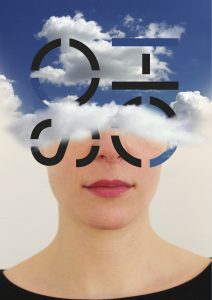
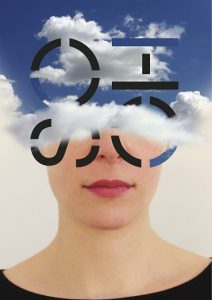
Graphics and Fotocredit: Caterina Krüger
To download the press pictures:
Please click once on a picture – it opens an extra window. Click on the right mouse button and click on the field “Save graphic as …”. If you have further questions, please contact contact@sohoinottakring.at



